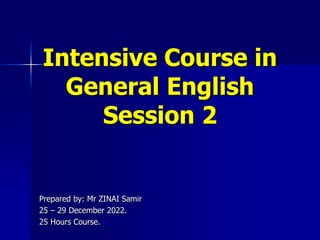001- Intensive Course in General English 26-12-2022.pptx
•Download as PPTX, PDF•
0 likes•2 views
english course
Report
Share
Report
Share

Recommended
More Related Content
Similar to 001- Intensive Course in General English 26-12-2022.pptx
Similar to 001- Intensive Course in General English 26-12-2022.pptx (20)
Recently uploaded
Recently uploaded (20)
ICT Role in 21st Century Education & its Challenges.pptx

ICT Role in 21st Century Education & its Challenges.pptx
Basic Civil Engineering first year Notes- Chapter 4 Building.pptx

Basic Civil Engineering first year Notes- Chapter 4 Building.pptx
Food Chain and Food Web (Ecosystem) EVS, B. Pharmacy 1st Year, Sem-II

Food Chain and Food Web (Ecosystem) EVS, B. Pharmacy 1st Year, Sem-II
Beyond the EU: DORA and NIS 2 Directive's Global Impact

Beyond the EU: DORA and NIS 2 Directive's Global Impact
This PowerPoint helps students to consider the concept of infinity.

This PowerPoint helps students to consider the concept of infinity.
General Principles of Intellectual Property: Concepts of Intellectual Proper...

General Principles of Intellectual Property: Concepts of Intellectual Proper...
Role Of Transgenic Animal In Target Validation-1.pptx

Role Of Transgenic Animal In Target Validation-1.pptx
Asian American Pacific Islander Month DDSD 2024.pptx

Asian American Pacific Islander Month DDSD 2024.pptx
Micro-Scholarship, What it is, How can it help me.pdf

Micro-Scholarship, What it is, How can it help me.pdf
Web & Social Media Analytics Previous Year Question Paper.pdf

Web & Social Media Analytics Previous Year Question Paper.pdf
001- Intensive Course in General English 26-12-2022.pptx
- 1. Intensive Course in General English Session 2 Prepared by: Mr ZINAI Samir 25 – 29 December 2022. 25 Hours Course.
- 2. Pronouns A pronoun replaces a noun. Subject Pronouns Object Pronouns Possessive Adjectives Possessive Pronouns Reflexive Pronouns I me my mine myself you you your yours yourself he him his his himself she her her hers herself it it its its itself We us our ours ourselves you you your yours yourselves they them their theirs themselves
- 3. Pronouns • We use a pronouns instead of a noun when it is clear who or what we are talking about . Examples: Ali is a good student. He passes all his tests.
- 4. Object Pronouns We use an object pronoun. – After a preposition. – After to and for with verbs like make, give, send, lend, pass, take, show. Do you live near them? Send the box directly to me. The little boy made it for her.
- 5. Reflexive Pronouns Reflexive pronouns are used: – For emphasize – With some special expressions Did you do the decorations yourself ? I did the painting myself. Help yourself . Enjoy yourself. Behave yourself. I live by myself. (I live alone)
- 6. Relative Pronouns • The relative pronouns are used to join sentences together. Who / whom / which / whose / that
- 7. Relative Pronouns Who : is used as a substitution of the «human» subject Here is the man. The man is a doctor. We delete “the man“ in the second sentence and replace it with ” who “ Here is the man who is a doctor. Examples: 1) The man came here. The man was a doctor. The man who was here was a doctor 2) My friend swims well. He lives here. My friend who lives here swims well. Who
- 8. Relative Pronouns Whom is used as a relative pronoun to substitute the object Example: The man came here. I visited him. We delete “him” and replace it with whom in the beginning of the second sentence, The man whom I visited came here. 1) The man was working with me. I paid him. The man whom I paid was working with me. 2) This is the girl. You gave her a flower. This is the girl whom you gave a flower. Whom
- 9. Relative Pronouns Which is used to substitute the subject or the object ( Objects not People) Example: He found his book. He lost it yesterday. He found his book which he lost yesterday. 1) This is the house. I live in it. This is the house which I live in. 2) This book is cheap. It is very useful. This book which is very useful is cheap. Which
- 10. Relative Pronouns That is used to substitute the subject or the object (both objects and subjects) This is the boy. You met her. This is the boy that (whom) you met. I have a bird. It sings. I have a bird that (which) sings. That
- 11. Relative Pronouns Whose is used for possession. This is the man. His car hit the boy. This is the man whose his car hit the boy. Here we have the word car is owned by the man, so, we omit the possessive pronoun his and put whose instead. Whose
- 12. Thank you for your interest and attention